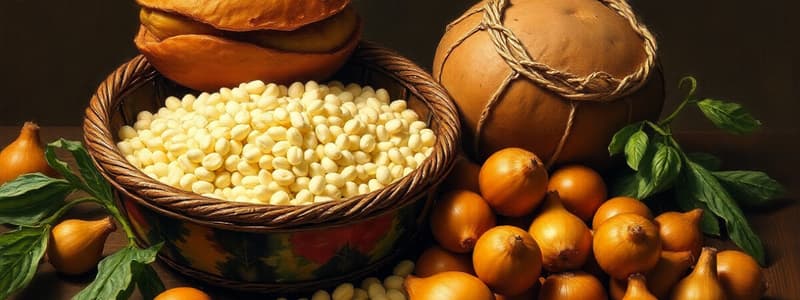Podcast
Questions and Answers
What disciplines are used in food science?
What disciplines are used in food science?
- Microbiology
- Chemistry
- Engineering
- All of the above (correct)
Food science is the discipline that studies the nature of foods, their deterioration, and the principles underlying __________.
Food science is the discipline that studies the nature of foods, their deterioration, and the principles underlying __________.
food processing
What are phytochemicals?
What are phytochemicals?
Plant derived chemicals that are biologically active.
What is the primary energy source from foods like grains, fruits, and vegetables?
What is the primary energy source from foods like grains, fruits, and vegetables?
Carbohydrates are composed of carbon, oxygen, and hydrogen.
Carbohydrates are composed of carbon, oxygen, and hydrogen.
Which of the following is a type of simple carbohydrate?
Which of the following is a type of simple carbohydrate?
Match the type of carbohydrate with its description:
Match the type of carbohydrate with its description:
What is glycogen?
What is glycogen?
Study Notes
Carbohydrates
- Carbohydrates are compounds with carbon, oxygen and hydrogen in their structure
- Carbohydrates provide energy source for living organisms through catabolism
- Carbohydrates are classified as monosaccharides, oligosaccharides or polysaccharides
- Carbohydrates are the primary nutritive energy sources from foods like grains, fruits, and vegetables
- Carbohydrates serve as energy storage for plants in the form of starch (amylose), and in animals in the form of glycogen
- Cellulose is a complex carbohydrate found in plant cell walls
- Chitin is a complex carbohydrate used in building arthropod exoskeletons and also found in the cell walls of Fungi.
Simple Carbohydrates
- Monosaccharides are simple sugars with a single unit of sugar
- Disaccharides are simple sugars with two units of sugar.
Complex Carbohydrates
- Glycogen is a complex carbohydrate stored in the liver and muscles of animals
- Starches are complex carbohydrates used by plants for energy storage
- Fibers are complex carbohydrates found in plants and are indigestible by humans
Monosaccharides
- Monosaccharides can exist in linear or ring forms
- The number of carbon atoms defines the type of monosaccharide:
- Pentoses have five carbon atoms, an example of a pentose is ribose
- Hexoses have six carbon atoms, an example of a hexose is glucose
- Isomers are molecules with the same chemical formula but with different structures (shapes)
- Glucose and fructose are both isomers, they have the same chemical formula (C6H12O6) but different structures.
- Monosaccharides form the basis of all larger carbohydrates.
Studying That Suits You
Use AI to generate personalized quizzes and flashcards to suit your learning preferences.
Related Documents
Description
This quiz explores the structure, classification, and functions of carbohydrates, including simple and complex forms. Learn about the role of carbohydrates in providing energy, storage, and their presence in various food sources. Ideal for students seeking to deepen their knowledge of biochemistry.



